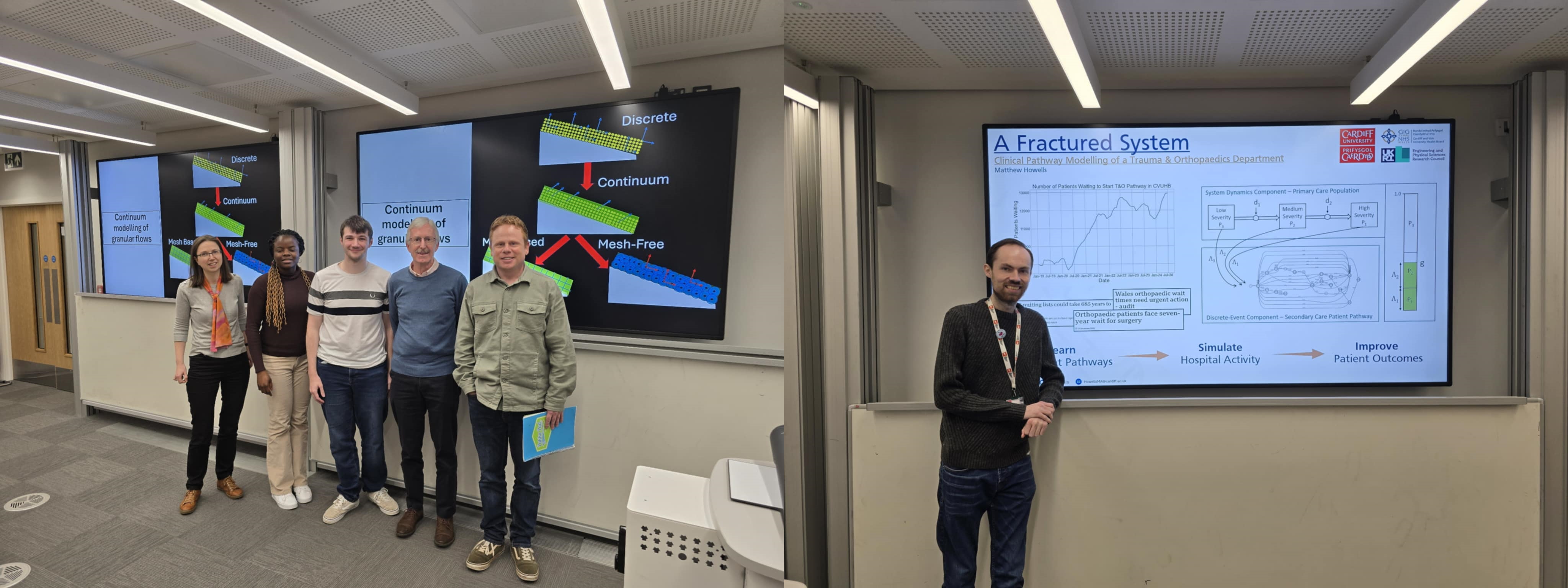
On the 12th of March, we held our traditional 3MT competition within the School of Mathematics. This competition provided the opportunity for PhD students to present a glimpse of their work to undergraduates, postgraduates and members of staff within the school, all within the time restraint of just 3 minutes using one static slide. There were four judges from a variety of mathematical backgrounds - Dr Kirstin Strokorb, Dr Nneka Umeorah, Prof Rhyd Lewis, and Prof Tim Phillips. Talks were given by the following PhD Students:
It really was a close fought competition and everyone did very well, so kudos to all who took part, you helped make the event a success! A massive thank you as well to the judges for their time and effort in judging the event, and to the audience for their support and engagement. The winners were:
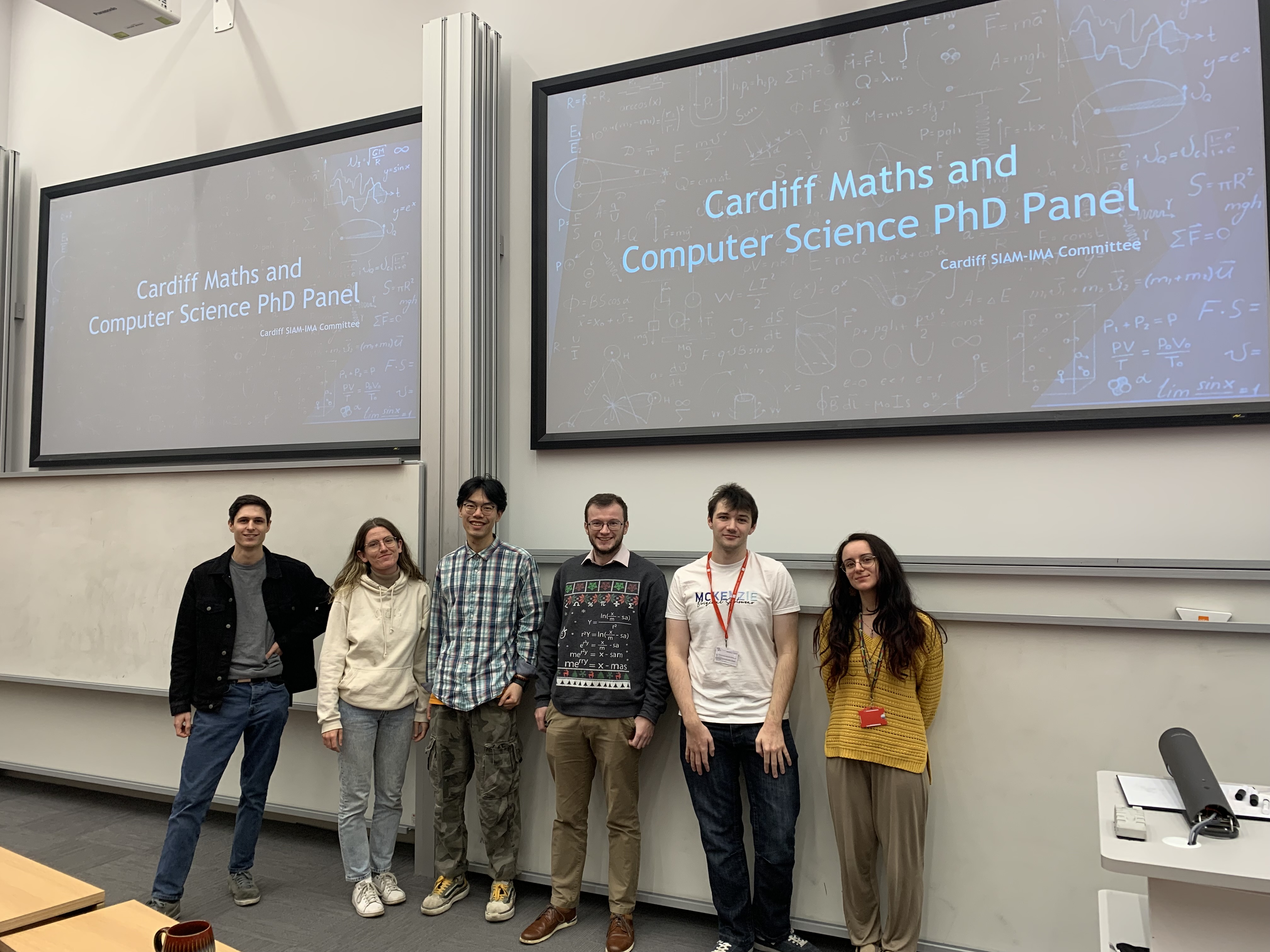
On Wednesday 4th of December, we ran our yearly PGR panel in Abacws with a panel of PhD students from Cardiff University. The event is designed for undergraduate and Master’s students to have an insight into what a PhD is like, and how and where they can look to apply to one. The event was attended by students from both the schools of mathematics and computer science, and talks were given on the following topics:
The panel was followed by a Q&A session
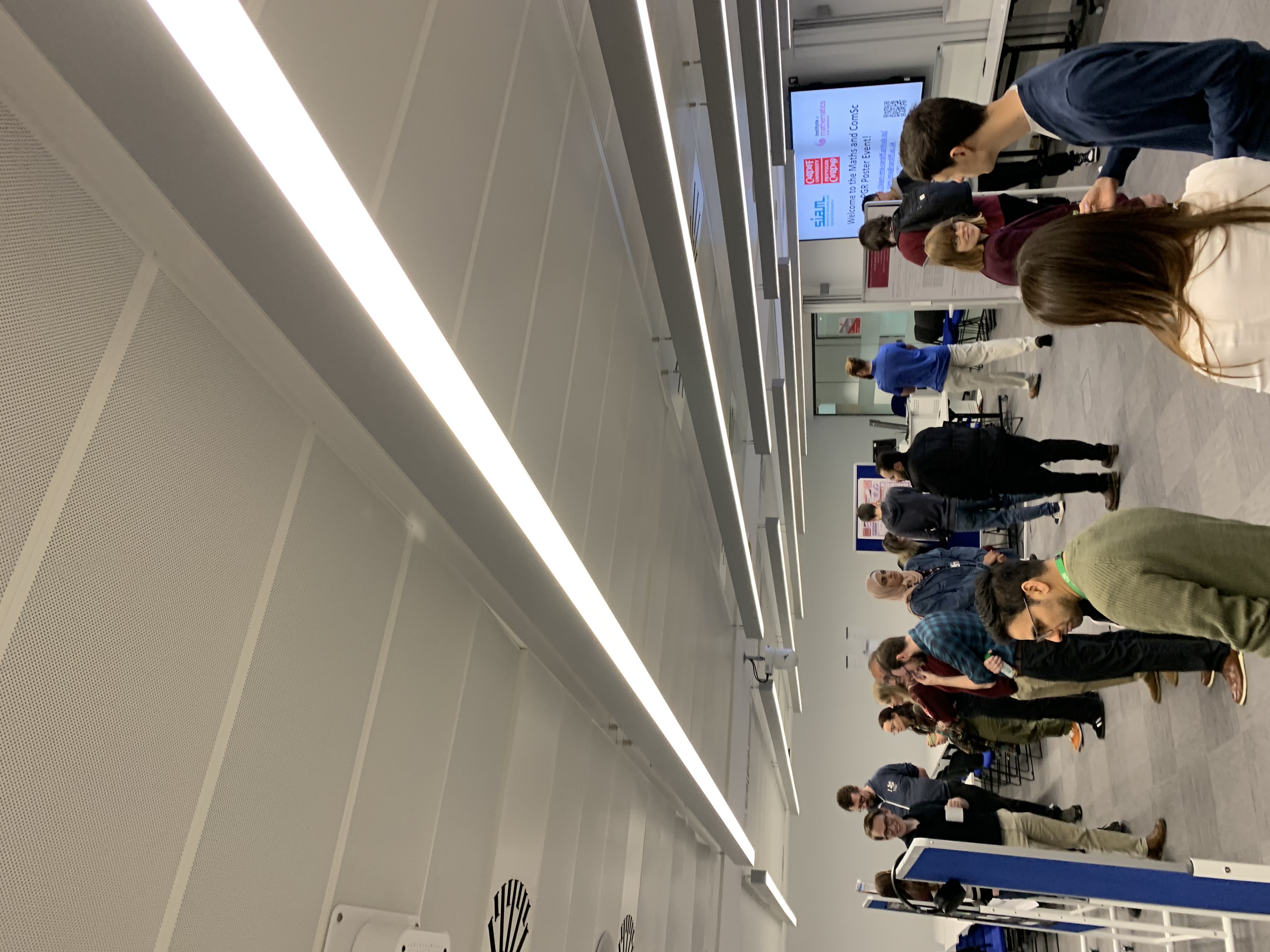
On the 2nd October 2024, we ran our PGR Poster Session for the School of Mathematics and School of Computer Science. The event showcased the rich and diverse postgraduate research happening in Abacws, and served as a nice ice-breaker for the new cohort of PGRs starting in October. In total, we were proud to showcase eight posters; five from Maths and three from Computer Science.
Posters from Maths were presented by Matthew Howells, Ghada Jameel, Anastasiia Kovtun, Charlie Marshall and Fan Wu.
Posters from Computer Science were presented by Max Curtis-Hedges, Jenny Highfield, and James Lewis-Cheetham.
We’re very grateful to the presenters for taking some time out to present at the event. We’d like to thank all staff and students in the School who popped by and showed an interest in PhD research. We hope the event was worthwhile to all!
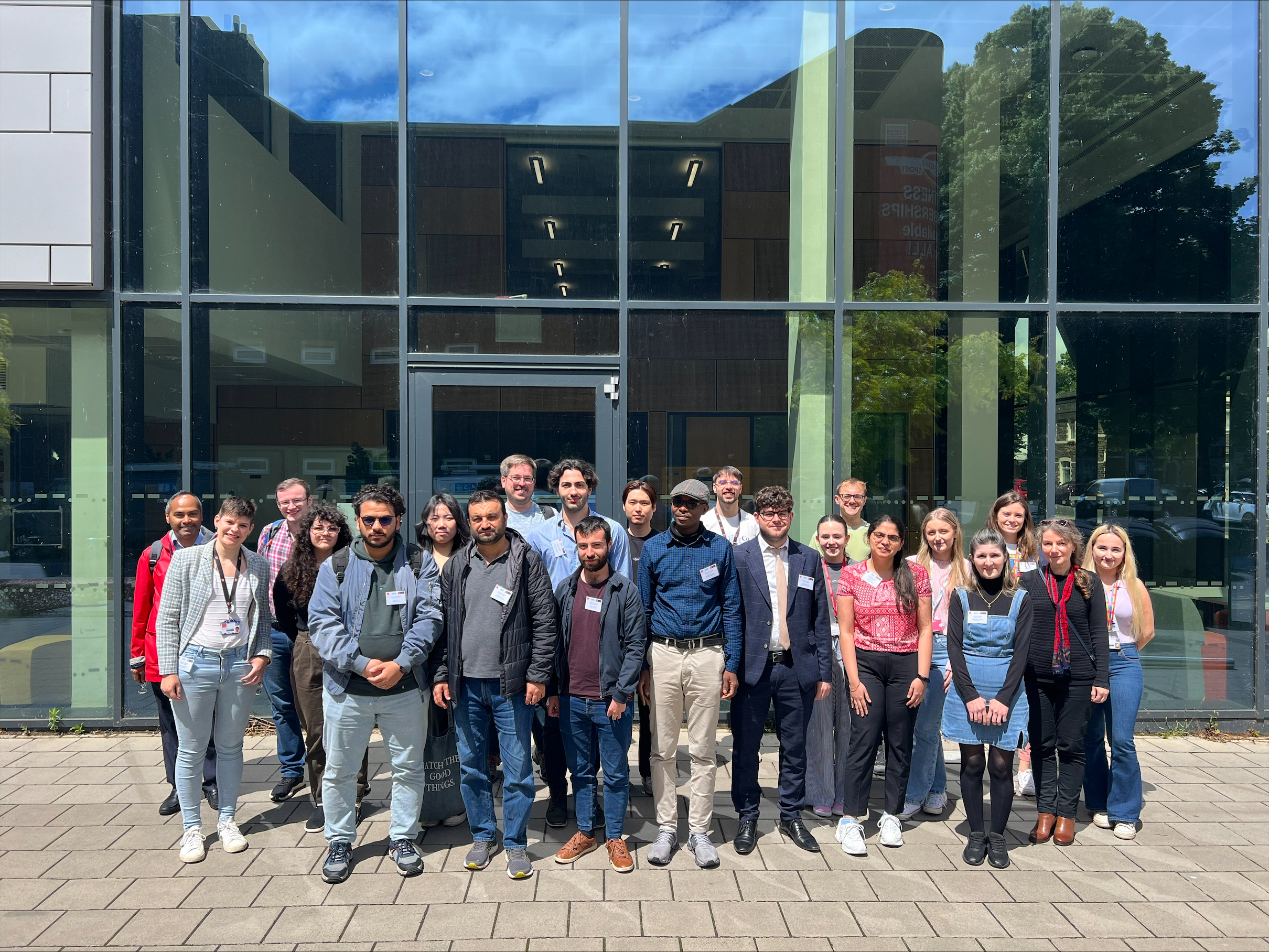
On the 13th and 14th of June, Cardiff School of Maths helf the SIAM UKIE National Student Chapter Conference 2024.
The event was organised by the SIAM-IMA Student Chapter, together with Dr. Elizabeth Williams and Prof. Angela Mihai. We were grateful to receive funding from both SIAM, and the Cardiff University Doctoral Academy, from which we were successfully awarded their Research Culture and Community Fund.
The conference was well attended, bringing together PhD students from multiple Schools at Cardiff University, as well as other institutions across the UK and Ireland. In all, delegates had the opportunity to attend four plenary talks, 13 contributed talks and a poster session, as well as countless opportunities to network and forge relationships.
The four plenary talks covered a wide range of mathematical areas and were given by:
The contributed sessions covered a wide range of mathematical topics, including analysis, applied mathematics, statistics, operational research and financial mathematics.
The poster session provided attendees with a great occasion to network and discuss research. The audience had the opportunity to rank the posters, and two prizes were awarded:
The conference was a great success and we received very positive feedback from the participants. We’d like to thank all those who participated in the event, whether attending, presenting, or part of the organisational team, in helping make the conference as successful as it was.
The Organising Committee – Michela Corradini, Matthew Howells, Prachi Sahjwani, Anastasiia Kovtun, Elizabeth Williams
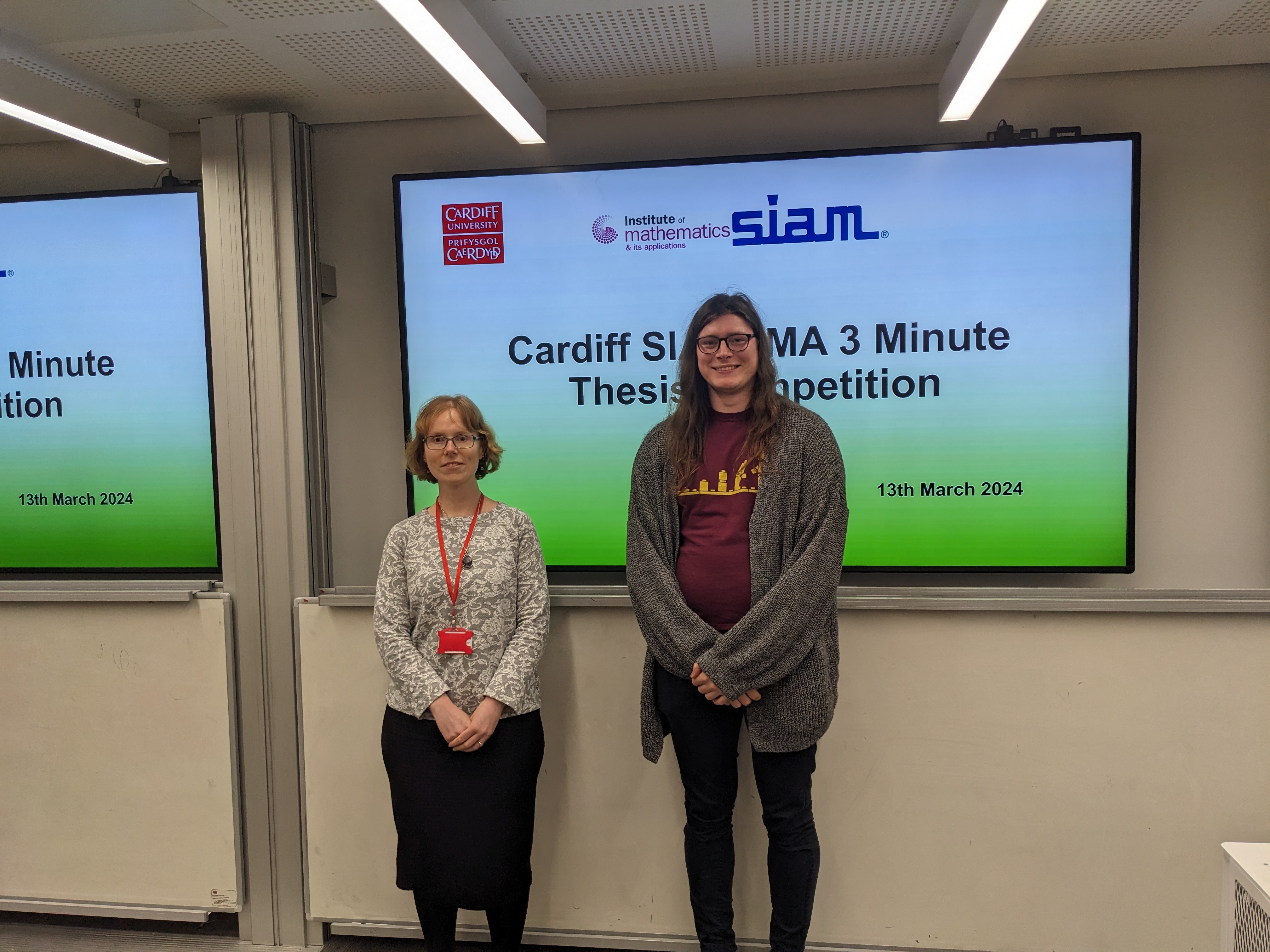
On the 13th of March, we held our first 3MT for the School of Computer Science. This competition provided the opportunity for PhD students to present a glimpse of their work confined to a very short time and a single slide. Invited to watch were undergraduates, postgraduates and members of staff within the school.
There were four judges from a variety of backgrounds - Dr Kirill Sidorov, Dr Louise Knight, Dr Victor Gutierrez Basulto, and Dr Sylwia Polberg-Riener.
Talks were given by the following PhD Students:
During the competition, each participant presented their talk, followed by the judges leaving the room to discuss their winner and the audience to vote on their favourite. Each talk was judged against the following criteria; content, clarity and charisma.
Although the results were close, two winners were selected:
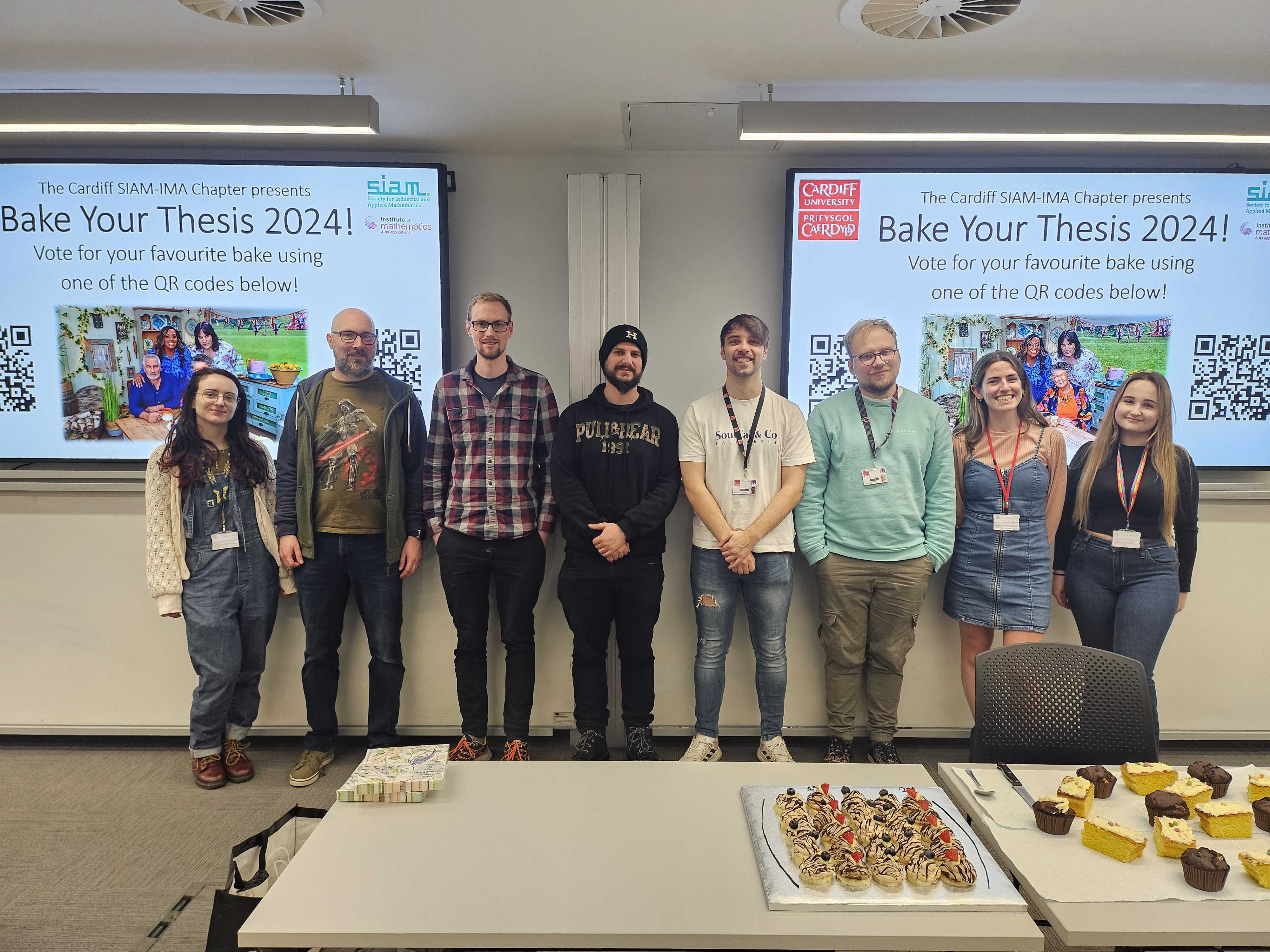
On the 21st of February, we returned for the second year of the Bake Your Thesis competition within the School of Mathematics and the School of Computer Science. Unlike the usual format of presenting research, in this competition, participants create a bake for their research theme, a particular result, or their research discipline. To judge the bakes we invited members of staff from Mathematics and the School of Computer Science, two from each school, for the primary vote. Fellow PhD students and members of staff were also invited to attend and cast an audience vote.
We had five judges, two for each of the schools and the winner from last years competition - Dr Thomas Woolley, Dr Ana Ros Camacho, Dr Martin Caminada, Dr Kathryn Jones, and Layla Sadeghi Namaghi.
Bakes were entered by the following PhD Students:
All the bakes were amazing, but there can only be one winner per category. This year the winners were:
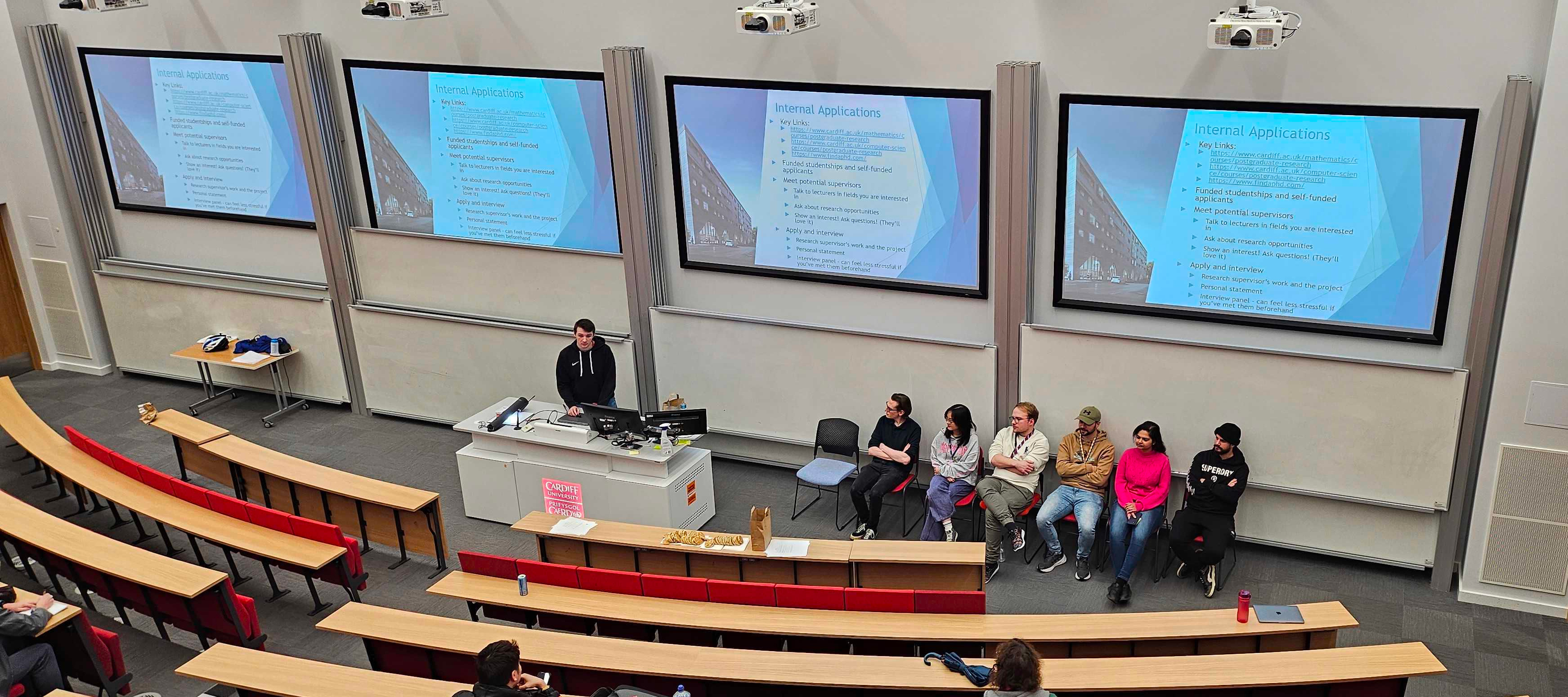
On Wednesday 29th of November, the PGR panel took place in Abacws with a panel of PhD students from Cardiff University. The event was attended by both undergraduate and postgraduate students from both schools of mathematics and computer science, and talks were given on the following topics:
The panel was followed by a Q&A session
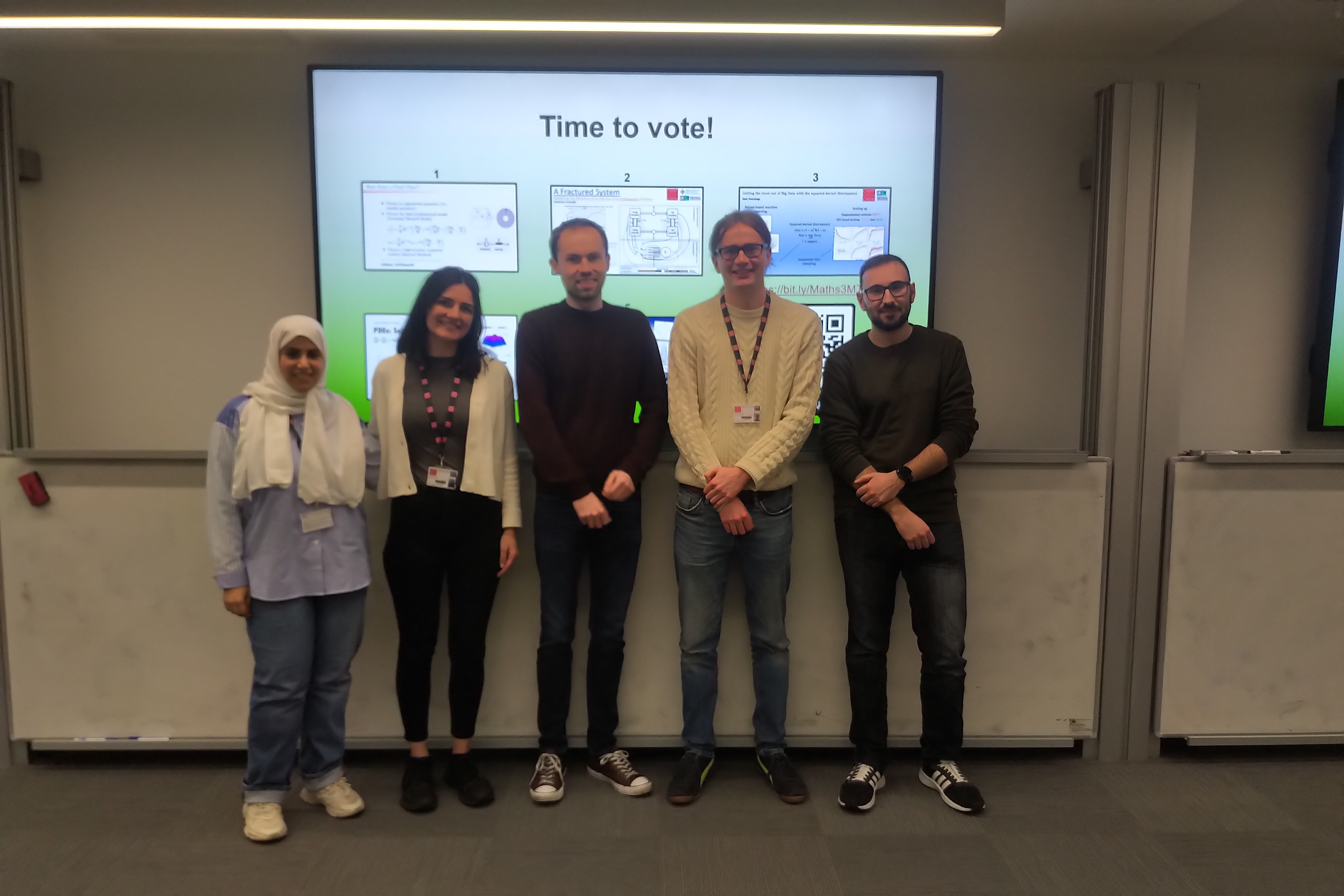
On the 8th of March, the Annual 3MT took place within the School of Mathematics. This competition provided the opportunity for PhD students to present a glimpse of their work to undergraduates, postgraduates and members of staff within the school, all within the time restraint of just 3 minutes. There were five judges from a variety of mathematical backgrounds - Dr Thomas Woolley, Dr Kirstin Strokorb, Dr Ulrich Pennig, Dr Nneka Umeorah and Timothy Ostler. Talks were given by the following PhD Students:
The quality of the presentations were outstanding, and the judges found it extremely difficult to pick a winner! The winners were:

On the 22nd of February, the inaugural Bake Your Thesis competition took place within the School of Mathematics and the School of Computer Science. This competition provided the opportunity for PhD students to present their work to postgraduates and members of staff within the schools in the form of a baked good. There were four judges, two for each of the schools - Dr Katerina Kaouri, Dr Ian Charlesworth, Dr Catherine Teehan and Dr Kirill Sidorov. Bakes were entered by the following PhD Students:
The quality of the bakes were outstanding, and the judges found it extremely difficult to pick two winners! The winners were:
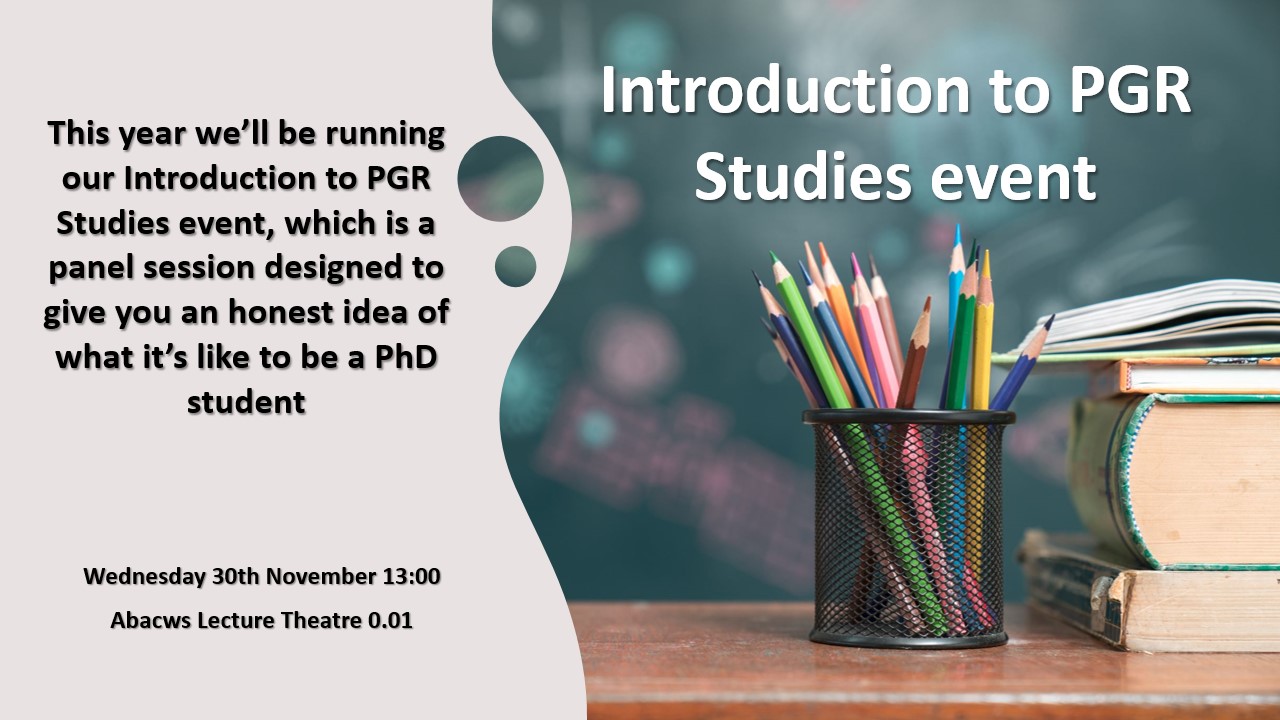
On Wednesday 30th of November, the PGR panel took place in Abacws with a panel of PhD students from Cardiff University. The event was attended by both undergraduate and postgraduate students from both schools of mathematics and computer science, and talks were given on the following topics:
The panel was followed by a Q&A session
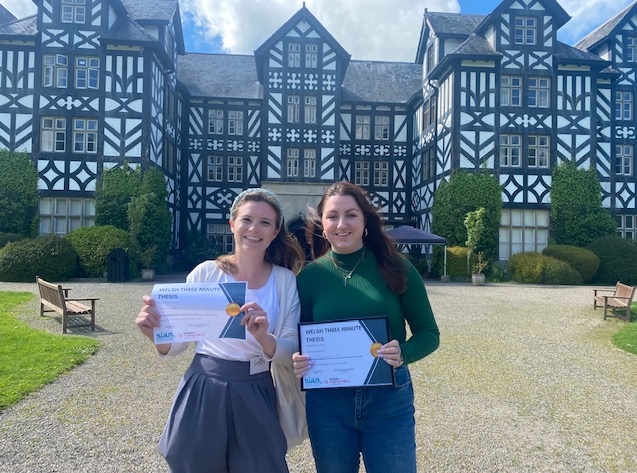
The Welsh Mathematics 3MT Competition was held at the Welsh Mathematics Colloquium at Gregynog Hall on the 22nd May 2022. This event brought together Mathematics PhD students from across Wales with the chance to present their work in just three minutes. The event was attended by fellow PhD students and academic staff from four universities: Aberystwyth University, Cardiff University, Swansea University and the University of South Wales.
There were four judges from a variety of mathematical backgrounds, one from each University - Dr Dwion Evans, Dr Matthew Lettington, Professor Jiang-Lun Wu and Dr Philip Trevelyan.
Talks were given by the following PhD Students:
Generalised Stirling Operators, with Applications - Chadaphorn Punkumkerd (Swansea University)
Inside the Bitcoin system - Gabriela Filipkowska (Cardiff University)
Knot another 3MT - Shauna Ford (Cardiff University)
Prediction of the capillary pressure and interface shapes in geometrically complex porous media - Afshin Daverpanah (Aberystwyth University)
Sum Systems - Ambrose Law (Cardiff University)
Viscoelastic Multiphase Flow - Will Doherty (Cardiff University)
The quality of the presentations were excellent, and provided an opportunity at the beginning of the conference to find out about research areas of fellow PhD Students. There was a judges winner alongside the audience favourite award:
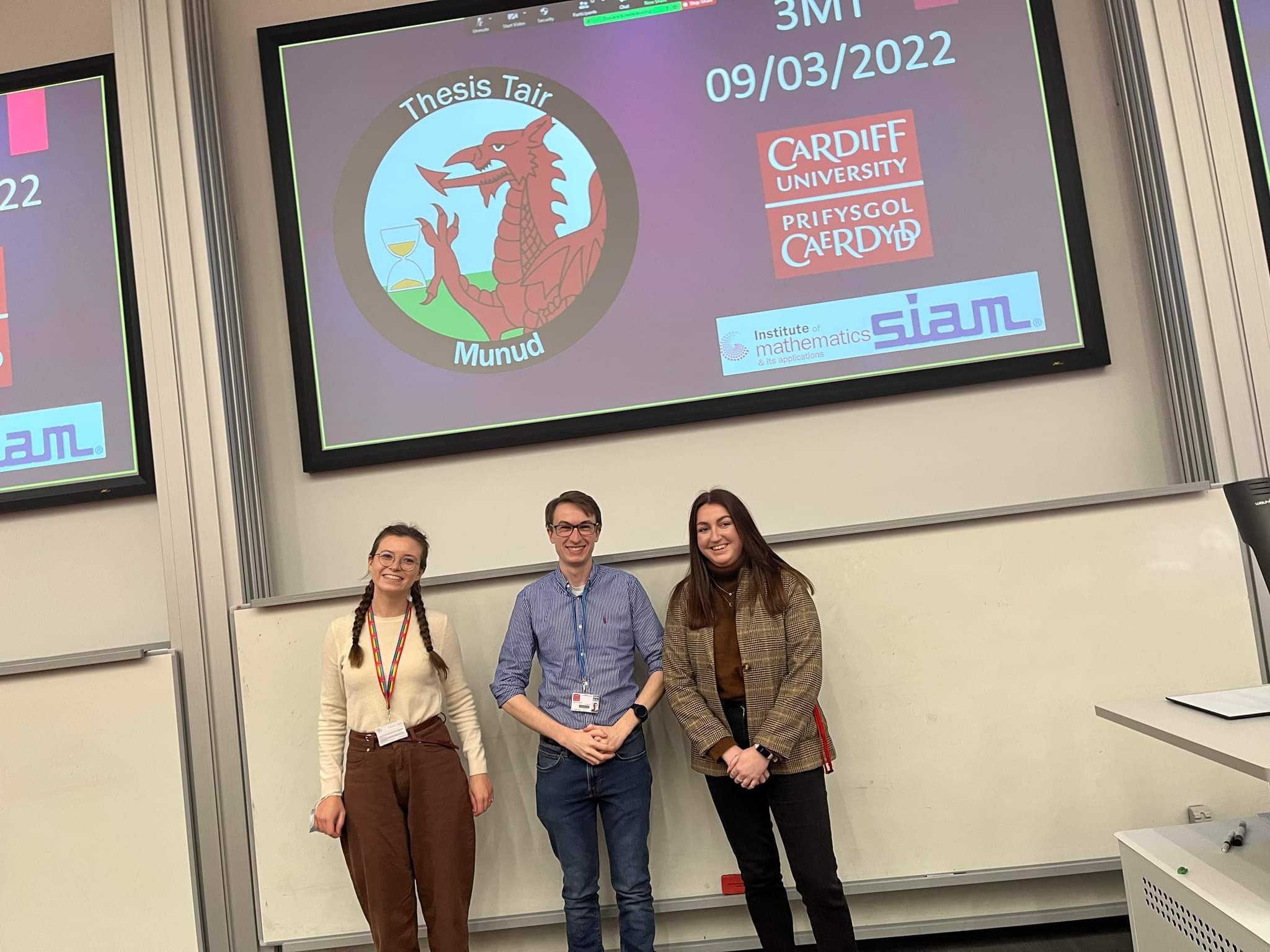
On the 9th of March, the Annual 3MT took place within the School of Mathematics. This competition provided the opportunity for PhD students to present a glimpse of their work to undergraduates, postgraduates and members of staff within the school, all within the time restraint of just 3 minutes.
There were five judges from a variety of mathematical backgrounds - Professor Maggie Chen, Dr Thomas Barker, Dr Kirstin Strokorb, Dr Ana Ros Camacho and Tasarla Deadman.
Talks were given by the following PhD Students:
The quality of the presentations were outstanding, and the judges found it extremely difficult to pick two winners!
The winners of 3MT won a Cardiff indie collection voucher as well as a copy of ‘50 Visions of Mathematics’ book. The winners were:
This year the Cardiff SIAM-IMA chapter is running a 3 Minute Thesis (3MT) competition, where Maths PhD students have the opportunity to present their research in the format of a three minute talk. This is a great chance for the students to hone their presenting skills, and also for attendees to learn about the kind of research that goes on in Cardiff School of Mathematics.The event will take place in Abacws 0.01 at 3:15pm on Wednesday 9th March, and there will be prizes for the winners of the competition as decided by our judging panel and an audience vote.We hope to see as many of you there as possible!
In person games evening will be returning on the first Tuesday of every month (Starting 8th February). We will be meeting in Abacws staff room from 5pm and bring any games you would like to play!

On the 1st of December, the PGR panel took place in Abacws with a panel of PhD students from Cardiff University. The event was attended by both undergraduate and postgraduate students, and talks were given on the following topics:
The panel was followed by a Q&A session.
This year we’ll be running our Introduction to PGR Studies event, which is a panel session designed to give you an honest idea of what it’s like to be a PhD student. It’ll take place at 14:00 on Wednesday 1st December in Lecture Theatre 0.01 in Abacws and will probably last around an hour. The event will be very informal and will mostly take the form of a free-form Q&A session, where the audience can ask questions about what it is we do all day. These are the topics that we will discuss through the session:
There will also be some light refreshments provided!
For our poster day we have 7 great presenters with their posters:
Name: Joshua Moore
Title: The interplay of geometry and polarity: graphical approaches to signal stability in bilayer cellular systems.
Abstract: Over the past two decades, fine-grain patterns produced by juxtacrine signalling have been
studied using static monolayers as cellular domains, where analytical results are limited to a
few cells due to the algebraic complexity of the required nonlinear dynamical systems.
Motivated by concentric patterning of Notch expression observed in the mammary gland, we
combine concepts from graph and control theory to represent cellular connectivity as a
transitional flow network. The resulting theoretical framework allows us to exploit the
symmetry of multicellular bilayer structures in 2D and 3D, thereby deriving analytical
conditions that drive the dynamical system to form laminar patterns consistent with the
formulation of cell polarity. Applying the analytic conditions to mammary organoids suggests
that intense cell signalling polarity is required for the maintenance of stratified cell-types
within a static bilayer using a lateral-inhibition mechanism. Furthermore, by employing 2D
and 3D cell-based models, we highlight that the cellular polarity conditions derived from
static domains have the capacity to generate laminar patterning in dynamic environments.
However, they are insufficient for the maintenance of patterning when subjected to
substantial morphological perturbations.
Name: Ambrose Law
Title: On Combinatorial Number Theory: Sum Systems And Their Structure
Abstract: The study of Sum Systems stem from a simple yet potent question; is it possible to find two sets of positive integers such that by taking the sum of each number in one set with each number in the other you generate the values 0,1,2,…,N for N any integer? The collection of these sets is called a Sum System and their structures are of combinatorial number theoretical interest.
Name: Yixiao Wang
Title: Deriving Word Vectors from Contextualized Language Models using Topic-Aware Mention Selection
Abstract: One of the long-standing challenges in lexical semantics consists in learning representations of words which reflect their semantic properties. The remarkable success of word embeddings for this purpose suggests that high-quality representations can be obtained by summarizing the sentence contexts of word mentions. In this paper, we propose a method for learning word representations that follows this basic strategy, but differs from standard word embeddings in two important ways. First, we take advantage of contextualized language models (CLMs) rather than bags of word vectors to encode contexts. Second, rather than learning a word vector directly, we use a topic model to partition the contexts in which words appear, and then learn different topic-specific vectors for each word. Finally, we use a task-specific supervision signal to make a soft selection of the resulting vectors. We show that this simple strategy leads to high-quality word vectors, which are more predictive of semantic properties than word embeddings and existing CLM-based strategies.
Name: Tasarla Deadman
Title: How braids can build a quantum computer
Abstract: A brief description on how Yang-Baxter representations of the Braid Group can be applied to quantum computing.
Name: Asma Irfan
Title: Interactive AI Technologies for Perceived-Value-driven Behaviour-Based Energy Management in Buildings
Abstract: The aim of Pervasive computing is to create ambience in which one’s experiences and quality of life are improved by monitoring and assisting people using ubiquitous technologies and computation in coherence. The atmospheres need computational techniques that can deal with the evolution and uncertainty of ubiquitous computing environments animatedly and automatically. We work to provide adaptive thermal comfort models developed through many studies which suggested that the dynamic thermal based behaviour of occupants can be utilized to optimize various energy influencing processes in the building.
Name: Lucy Maybury
Title: Optimising the Transition to Electric Vehicles: The UK Problem
Abstract: As decarbonisation is becoming increasingly important, many countries have placed an emphasis on decarbonising their transportation sector through electrification to support the transition to net zero. As such, many countries are transitioning from conventional vehicles to electric vehicles in their transportation sector. Mathematical modelling plays an important role in optimising a transition to electric vehicles, which is the focus of this project.
Name: Michalis Panayides
Title: The Ambulance Decision Game
Abstract: Operational Research (OR) techniques provide a toolkit of mathematical modelling approaches that are routinely used for problem solving in many sectors. Recent research shows that behavioural studies may accompany such techniques and offer some additional insight to the problem studied and thus enrich some of the already existing traditional methods. Ethnography is considered to be one of the main such approaches. Ethnographic studies have been around since the 19th century and their main guiding methodology is that a researcher that aims to study a specific social setting should acquire a deeper understanding of the cultural norms and values. The main technique that accompanies ethnography is participant observation, where the researcher participates in the social setting they wish to study recording their observations. The application of these ideas and principles considered here is the emergent behaviour that takes place at the interface between Emergency Medical Services (EMS) and the Emergency Department (ED). Numerous decisions are taken by both patients and staff alike that determine the level of workflow and the patient pathway. There is empirical evidence to suggest that imposing targets in the ED results in gaming at the interface of care between the EMS and ED. In this work, multiple scenarios are examined where an ambulance service needs to distribute patients between neighbouring hospitals. The interaction between the hospitals and the ambulance service is modelled in a game theoretic framework, supported by a novel Markov model, where the ambulance service has to decide how many patients to distribute to each hospital. This work brings together ethnography and game theory to understand the emergent behaviour in healthcare settings. The talk will present the problem being tackled at the interface of the EMS and the ED that is to be further informed by ethnographic methods.
Our first event for this acedemic year is a Poster Day on the 1st October at 15:30-16:45. This will be a virtual event taking place on gather.town. If you would like to present a poster, please submit its title, abstract and a jpg/png of the poster by Monday 27th September. This can be sent to our email address. Otherwise please feel free to come along and vote for your favourite poster as there will be 1st, 2nd and 3rd place prizes!
The SIAM-IMA student chapters at Strathclyde, Manchester, Cardiff and Dublin have joined forces to organize a joint event.
We will be hosting a social event consisting of a careers talk given by Ben Tordoff and Oli Tissot of MathWorks. The event will take place on Zoom on Wednesday 9th December @ 4pm
MathWorks is primarily known as the developer of MATLAB, amongst other products. Ben has been with MathWorks for 15 years, and currently manages a team developing parallel computing products. Oli joined MathWorks as a software engineer in 2019, having previously completed a PhD in numerical linear algebra. Ben and Oli will tell us a bit about what MathWorks does, and in particular the parallel computing team based in Cambridge, and what it’s like to work there!
The talk will be followed by a social event - a team table quiz! We plan to run a table quiz after the talk to give our members a chance to meet and socialize in an informal setting - given everything that is going on the moment we need it!
There will be prizes for the winners and second place: £80 for first place team and £40 for second place team.
Event Timing: Wednesday December 9th Talk @ 16:00 - 16:45 Quiz @ 17:00 - 17:45
Contact us at: @siam.ima.dublin@gmail.com
On December the 1st a virtual session of a panel of PhD students from Cardiff University was set up. These gave short talks on the following topics.
• Applying internally - Emily O’Riordan
• Applying externally - Álvaro Torras Casas
• A day in the life of a PhD student- Tasarla Deadman
• Maths community in Cardiff - Emily O’Riordan
• External opportunities – Emily Williams
• Teaching - Timothy Ostler
• Funding/scholarships - Abhishek Chakraborty
• Industrial partners – Elizabeth Williams
This was followed by questions afterwards.
Hi everyone!
We have our first Women in Mathematics (WiM) event of the academic year planned – a talk by our own wonderful Maggie Chen on Tuesday October 27th 1-2pm. She will speak about her research, as well as her experiences as a female mathematics researcher.
This event is open for everyone to attend and I hope to see lots of you there!
This will be the first of a new seminar series WiM has set up in collaboration with the Piscopia Initiative called PiWORKS – Piscopia Women and Other Researchers Keynote Seminars. It will be a monthly seminar highlighting female and non-binary researchers in mathematics, with the research discussed aimed to be accessible for undergrads.
Click here for the zoom details, or use the following details:
Meeting ID: 898 0861 0367, Password: PiWORKS
Alternatively, use Skype for business.
-Tasarla
The Cardiff SIAM chapter now has a website!
We look forward to welcoming new students in October, and we hope to start up many of the postgraduate events we used to run before Covid-19. We will upload new posts as we go to keep you informed.
To welcome new and returning PGR students to the department, we will be hosting a virtual poster presentation on October 7th, featuring work from current students. Students can vote on their favourite poster, with prizes for the top three posters! The session will run from 11:00-12:15, and will be followed by virtual tea.
If you wish to submit a poster, please email us with your poster title, and a brief abstract, by 28th September.
This is a great opportunity to meet the current students, get a taste for what research life is like and get involved in postgrad life, so we hope to see you there.


